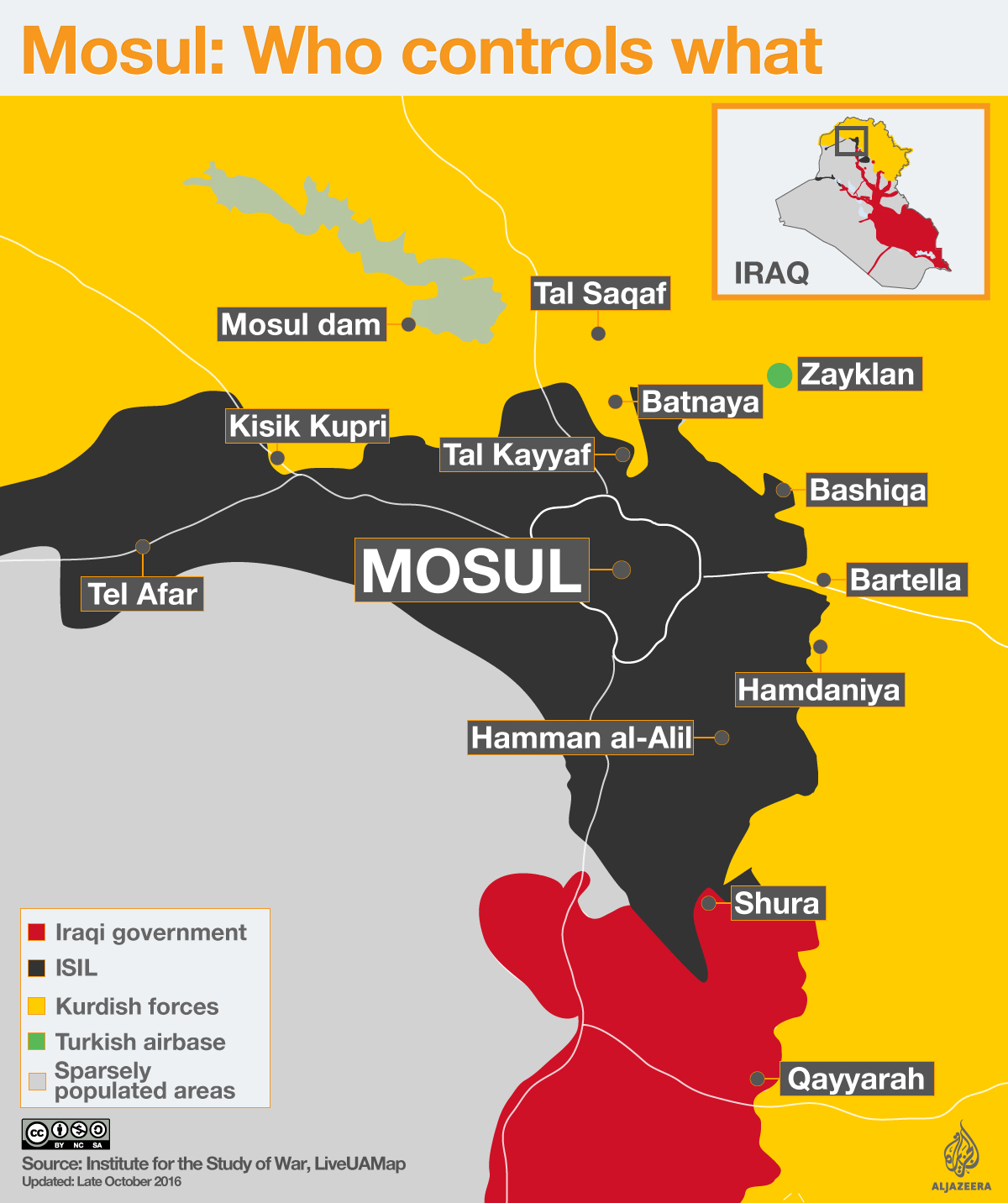Iraq-Turkey tension rises amid battle for Mosul
Deployment of Turkish military near border elicits warning from Iraq’s PM, but Ankara says the move is a precaution.

Iraq’s prime minister has warned Turkey against provoking a confrontation while saying he does not want war.
Haider al-Abadi made the comments after Turkey deployed tanks and artillery near the Iraqi border and insisted that any Turkish involvement would be a violation of national sovereignty.
Keep reading
list of 4 itemsRussia-Ukraine war: List of key events, day 810
Russia-Ukraine war: List of key events, day 809
Russia’s Putin to remove Sergei Shoigu as defence minister
Turkey wants a a role in the battle to retake Mosul from the Islamic State of Iraq and the Levant (ISIL) group, by virtue of being a member of the anti-ISIL coalition.
|
|
However, Abadi rejected this assertion and repeatedly called on Turkey to withdraw troops it has deployed near the northern city.
“The invasion of Iraq will lead to Turkey being dismantled,” Abadi said in a televised news conference on Tuesday.
“We do not want war with Turkey, and we do not want a confrontation with Turkey.
“But if a confrontation happens, we are ready for it. We will consider [Turkey] an enemy and we will deal with it as an enemy.”
Turkish reaction
Ini response, Turkish Deputy Prime Minister Numan Kurtulmus said on Wednesday the military build-up on the border with Iraq was a precaution, not a threat, and called on Abadi to lower tensions.
“We recommend that Abadi sees the big game, as well as the big picture,” he told Turkish private news channel NTV.
“I regard Abadi’s words as overstepping the mark,” he added.
“Making Sunni and Shia forces clash against each other in this region […] means fanning the flames of ethnic and sectarian unrest in Iran, Iraq, Syria, Lebanon, Jordan and Turkey.
“Abadi must make statements lowering the tension. This is for the benefit of Iraq, Turkey and the region.”
On Tuesday, Turkish military sources said that tanks and artillery were being sent to southeastern districts near the Iraqi border.
The 30-vehicle convoy left Ankara for Silopi, the sources told AFP news agency, adding that it was now close to Adana province in southern Turkey.
Fikri Isik, Turkey’s defence minister, said the deployment was part of Turkey’s preparation for “important developments in the region”, referring to Kurdish fighters inside the country and events in Iraq.
“Turkey is preparing in advance for whatever happens [and] this is one element of that,” he was quoted by the official Anadolu news agency as saying.

Just over two weeks into the ongoing offensive to retake Mosul, ISIL’s last major stronghold in Iraq, soldiers managed to push within city limits.
The Iraqi army said its forces have advanced to the eastern edge of Mosul for the first time since the ISIL, also known as ISIS, overran the city more than two years ago.
The country’s Joint Operations Command said in a statement on Tuesday that its forces had entered Judaydat al-Mufti, an area on the outskirts of Mosul, about 3km away from the city’s airport.
Meanwhile, Iraqi State TV reported that the 9th armoured brigade had entered the district of Dweikhlah, in an attempt to open up a separate front in the battle against the armed group.
Biggest prize
Mosul was the biggest prize captured by ISIL when it swept through much of Iraq’s north and west in the summer of 2014 and declared a “caliphate” across those lands and the ones it captured in Syria.
Estimates of the number of ISIL fighters in Mosul vary from a few thousand to “not more than 10,000,” according to the Iraqi government and the anti-ISIL coalition.
|
|
The Mosul offensive involves tens of thousands of Iraqi government soldiers, federal police, Kurdish fighters, Sunni tribesmen and Shia militias.
Many of the militias – considered to be backed by Iran – were originally formed after the 2003 US-led invasion to fight American soldiers and Sunni armed groups.
They were mobilised again, and endorsed by the government, when ISIL swept through Iraq in 2014, but they also have been repeatedly accused of human rights violations against the country’s Sunni minority.
The United Nations forecasts that up to one million people risk being uprooted by the fighting, which UN aid agencies say has so far forced about 17,500 people to flee, a figure that excludes those taken into Mosul by the retreating fighters.
In a monthly report released by the UN Assistance Mission for Iraq, 1,792 people were killed in violence in Iraq in October, up from 1,003 the previous month.
An estimated 1,120 of the dead were civilians.
|
|